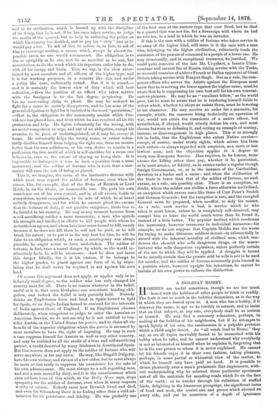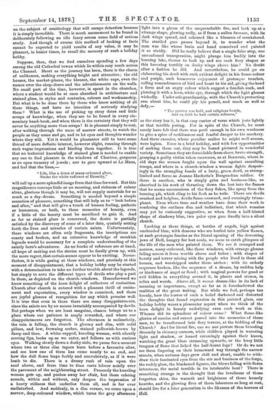A HOLIDAY HOBBY.
HOBBIES are useful sometimes, though we are too much bored with the hobbies of other people to think so readily. The fault is not so much in the hobbies themselves, as in the way in which they are forced upon us. A man who has a hobby, if it deserves the name, is apt to be terribly in earnest, and to insist that on that subject, at any rate, everybody shall be as serious as himself. He may find a necessary relaxation, perhaps, in smiling at the hobbies of his neighbours, but if he attempts to. speak lightly of his own, the carelessness is a palpable pretence which a child might detect. As "all roads lead to Rome," they say, so are all topics inevitably found to be connected with his hobby when he talks, and he cannot understand why everybody is not as interested as himself when he explains it, forgetting that he is the one person to whom it is never explained. He cannot let his friends enjoy it in their own fashion, taking pleasure, perhaps, in some partial or whimsical view of the matter, to- which he himself may have paid no heed. It is possible to dream pleasantly over a man's prehistoric flint implements, with- out understanding why he selected those particular specimens out of all the materials for mending roads which lie on the face of the earth ; or to wander through his collection of stuffed birds, delighting in the humorous groupings, the significant turns of head and neck, the quaint airs and graces which abound on every side, and yet be conscious of a depth of ignorance
"Life, like a dome of many-coloured glass, Stains the white radiance of Eternity,"
• call up a more splendid image from that time forward. But this
magnificence conveys little or no meaning, and richness of colour alone, glorious though it may be, will not supply materials for so much as a day-dream. Something is needed beyond a simple sensation of pleasure, something that will help us to "look before and after," and that will give a touch of human feeling, pathetic or humorous, or both, to these memories of beauty, even if a little of the beauty must be sacrificed to gain it. And as far as stained glass is concerned, the desire is partially satisfied by the discovery of some of a later date, quaintly setting forth the lives and miracles of certain saints. Unfortunately, these windows are often only fragments, the inscriptions are scanty and broken, and an extensive knowledge of monkish legends would be necessary for a complete understanding of the saintly hero's adventures. As no books of reference are at band, all hope of making out the stories must be finally given up, with the more regret, that certain scenes appear to be exciting. Never- theless, it is while gazing at these windows, and precisely at this moment of disappointment, that a holiday hobby may be started with a determination to take no further trouble about the legends, but simply to note the different types of devils who play a part in them, as depicted on the church-windows. Henceforward we know something of the keen delight of collectors of curiosities. Church after church is entered with a pleasant thrill of excite- ment and expectation, every window is examined, and there are joyful glances of recognition for any which promise well. It is true that even in these there are many disappointments, since the saints are by no means invariably accompanied by devils. But perhaps when we are least sanguine, chance brings us to a place where our patience is amply rewarded, and where our disappointments are forgotten. The afternoon is melancholy, the rain is falling, the church is gloomy and dim, with solid pillars, and low, frowning arches, stained yellowish-brown by damp and time. A white-capped, kneeling woman, with silently moving lips, looks up as we enter, and follows us with curious eyes. Walking slowly down a dusky aisle, we pause for a moment where two or three slim tapers burn before a favourite altar, and see how one of them has come nearly to an end, and how the dull flame leaps feebly and convulsively, as if it were loath to die. There is a dreary rush of rain upon the roof above, and from time to time carts labour noisily over the pavement of the neighbouring street. Presently the kneeling woman gets up, and pushes away her cliair, but these echoing sounds, within and without, only deepen the impression of a heavy stillness that underlies them all, and is for ever undisturbed. And suddenly, in a dim corner, we come upon a narrow, deep-coloured window, which turns the grey afternoon on the subject of ornithology that will escape detection because it is simply incredible. There is much amusement to be found in deliberately following an idle fancy across some field of serious study. And though of course this method of looking at facts cannot be expected to yield results of any value, it may be pleasant, in busier times, to recall the memory of such a holiday hobby.
Suppose, then, that we find ourselves spending a few days among the old Cathedral towns which lie within easy reach across the ChanneL Short as the journey has been, there is the charm of unlikeness, making everything bright and attractive ; the old houses, the market-places, the blouses, the white caps, even the names over the shop-doors and the advertisements on the walls.
No small part of the time, however, is spent in the churches, where a student would be at once absorbed in architecture and stained glass, in styles and centuries, colours and workmanship.
But what is to be done there by those who know nothing of all these things, and have no intention of seriously studying them? What is the use of picking up stray dates and little scraps of knowledge, when they are to be found in every ele- mentary hand-book, and when there is the certainty that they will
never be anything more than scraps? It is pleasant simply to rest, after walking through the maze of narrow streets, to watch the people as they come and go, and to let eyes and thoughts wander where they will. Yet it would be pleasanter still to have some thread of more definite interest, however slight, running through such vague impressions and binding them together. It is true that no technical knowledge of stained glass is needed to enable any one to find pleasure in the windows of Chartres, gorgeous as an open treasury of jewels ; nor to gaze upward at Le Mans, and feel that the lines,— light into a gleam of the unquenchable fire, and look up at a strange shape, glowing redly, as if from a sullen furnace, with its dark wings spread, and coloured like a blossom of monkshood. The startled gaze passes beyond it, to wonder what the man was like whose brain and hand conceived and painted it so vividly. Did he really believe that a single false step, one unconfessed transgression, might plunge him bodily into the burning lake, thence to look up and see such fiery shapes as this hovering terribly on dusky wings above him ? No doubt after a fashion he did. And nevertheless, he could go on elaborating his devil with such evident delight in his flame-colour and purple, such humorous enjoyment of grotesque touches, calling remembrances of bird and beast to his aid, giving the head a form and an angry colour which suggest a fiendish cock, and piercing it with a keen, white eye, through which the light gleams wickedly. Under safe guardianship, with the Church's protecting arm about him, he could ply his pencil, and mock as well as defy,—
" Tho painter was bold, and religious beside, And on faith he had certain reliance,"
as the story has it, in that easy canter of verse which jests lightly at that terrible jesting. For in spite of the Church, he must surely have felt that there was peril enough in his own weakness to give a spice of recklessness and fearful danger to his mockery. And these enemies, whose peculiar malice he might well arouse, were legion. Even in a brief holiday, and with few opportunities of seeking them out, they may be found pictured in wonderful variety. Sometimes they are formidable from sheer, brute strength, grasping a guilty victim taken unawares, as at Beauvais, where in old days the women fought upon the wall against assaulting troops, and where in a church-window a woman fights despair- ingly in the strangling hands of a lusty, green devil, as strong- limbed and fierce as Jeanne Hachette's Burgundian soldier. Or there is another, who is simply grim and business-like, so absorbed in his work of thrusting down the lost into the flames that he seems unconscious of the fiery flakes, like spray from the burning pit, which cling to his flesh as he toils. There are devils crushed and helpless, devils flame-crowned, and cunningly trium- phant. Even where time and weather have done their work in rendering the outlines dim and indistinct, that which remains may yet be curiously suggestive, as when from a half-hinted shape of shadowy blue, two paler eyes gaze fixedly into a silent church.
Looking at these things, at battles of angels, high against unclouded blue, with demons who are hurled into yellow flames, at such grotesque fancies as the literal opening of the devouring jaws of Hell, hungry for lost souls, we seem to catch glimpses of the life of the men who painted them. We see it cramped and narrow, many-coloured, like these windows, with strange gleams falling across it from worlds above and below ; with shapes of beauty and terror mixing with the people who lived in these old houses, and worshipped under these arches ; with its orderly sequence broken, like the sequence of a dream, by sudden help or hindrance of angel or fiend ; with magical powers for good or evil hidden in everything around it, in plants and stones, in relics and words. Above all, it seems dream-like in its lack of meaning or importance, except so far as it foreshadowed the realities of the great waking. But while we feel, perhaps too keenly, how the horror of such a belief darkened and distorted the thoughts that found expression in this painted glass, our holiday hobby wears a pleasanter aspect when we think of the keen delight in beauty underlying even such work as this. Whence did its splendour of colour come ? What flame-like glories of sunrise and sunset passed into the memories of these men, to be transformed into fiery terrors, at the bidding of the Church? And for literal fire, can we not picture them brooding dreamily in chimney-corners, while children played in wavering light and shadow, or leaned caressingly against their knees, watching the great blaze streaming upwards, or the busy little tongues of flame that licked the half-burnt logs? Or do we not see them lingering on their homeward way through the narrow streets, when autumn days grew chill and short, unable to with- draw their fascinated eyes from the stir and business of the forge, the ruddy glow, the blackened figures, the blows falling with fierce intentness, the metal terrible in its intolerable heat? There is something strange in the thought that the loveliness of those forgotten skies, the warmth and brightness of those homely hearths, and the glowing fires of those labourers so long at rest, should live for a later generation in the likeness of the horrors of HelL































 Previous page
Previous page